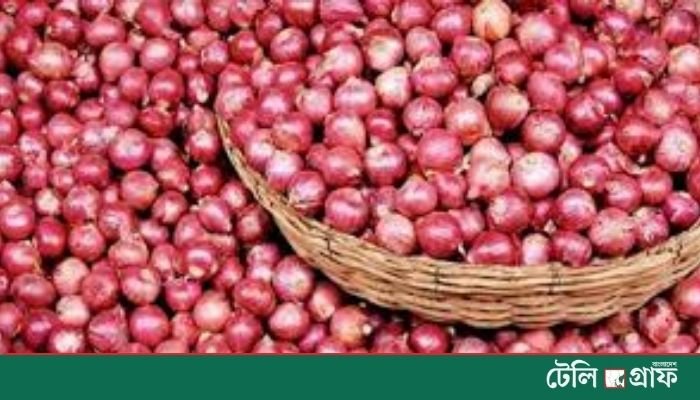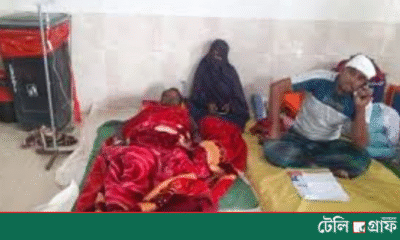Business
Rice and Onion Prices Stay High in Dhaka as Fish, Vegetables Turn Costlier

Rice and onion prices have remained high in Dhaka markets for over a month, while the cost of fish and several vegetables continues to rise. Wholesalers are selling rice at no less than Tk 58 per kilogram, while retail buyers are paying between Tk 60 and 65.
During a visit to Karwan Bazar on Friday, coarse rice varieties like Paijam and Atash were found selling for Tk 58–60 per kg, and Miniket for Tk 76–80. Retailers charged at least Tk 5 more. “Prices increased slightly two months ago and haven’t changed since,” said rice trader Belal Hossain.
Onion prices have surged from Tk 80 to Tk 120 per kg in recent weeks. Vendor Al Amin said the rise was due to low supply and suggested that imports may be necessary. In residential areas, onions are being sold for up to Tk 130 per kg.
Meanwhile, potatoes are selling for Tk 20 per kg, while prices of garlic and ginger remain unchanged. Chinese garlic costs Tk 160, local garlic Tk 80–100, Thai ginger Tk 200, and Chinese ginger Tk 180 per kg.
Fish prices have also gone up due to reduced supply. Pangas and tilapia now cost Tk 190–200 per kg, pabda Tk 400, and rui between Tk 280 and 350.
Vegetable prices show mixed trends. Potol, snake gourd and okra sell for Tk 50–60 per kg, while cauliflower and cabbage are Tk 30 each. Eggplants range between Tk 50 and 100, long beans between Tk 80 and 90, and bottle gourds between Tk 50 and 60.
Prices of eggs, chicken, and meat have remained stable. A dozen eggs sell for Tk 130, broiler chicken for Tk 170 per kg, beef for Tk 750, mutton for Tk 1,200, and goat meat for Tk 1,100.
Business
Bangladesh Enforces Unified Fertilizer Policy to Break Syndicate Control

Bangladesh has approved a new policy titled the “Integrated Fertilizer Dealer Appointment and Distribution Policy 2025,” aiming to overhaul the country’s fertilizer distribution system. A government gazette issued on Thursday confirmed that the policy will come into effect from Sunday, following approval by the National Coordination and Advisory Committee on Agriculture.
The policy introduces major reforms, including transparent bidding, digital monitoring, stricter eligibility criteria for dealer appointments, a ban on multiple dealerships within a family, and the abolition of the longstanding sub-dealer system. According to the Ministry of Agriculture, the primary objective is to dismantle monopolistic control and syndicate-based manipulation in fertilizer distribution. An influential group of transport contractors and dealers had long been accused of hoarding fertilizers and creating artificial shortages, forcing farmers to buy at higher prices.
Under the new framework, the dual dealership structure of BADC and BCIC has been merged into a single system. Fertilizers from all sources—government, semi-government, or private—will now be distributed under one unified policy. Each union, municipality, and city corporation will have a fixed number of dealer units, and every dealer must operate three designated sales centers displaying subsidy and pricing information. All transactions, withdrawals, and records must be maintained digitally.
The policy bars government employees, public representatives, individuals convicted in criminal cases, and multiple members of the same family from becoming dealers. The security deposit has been raised to Tk 400,000, while the renewal fee has been set at Tk 1,000. Dealer performance will be routinely assessed, with provisions for renewal or cancellation based on evaluation.
Vacant dealer units will be filled through recommendations from upazila and district fertilizer and seed monitoring committees. District administrations must publish lists of vacant units alongside recruitment notices. All fertilizer dealers will be registered and listed under the new policy.
Business
Roadside petrol sales temporarily banned as security tightened ahead of 13 November

The government will temporarily ban the sale of fuel at roadside stalls, the Adviser to the Home Minister, Lieutenant General (retd.) Md Jahangir Alam Chowdhury, has announced, saying such fuel can be used to cause incidents.
Speaking to reporters at the secretariat, he said authorities are on heightened alert ahead of the 13 November lockdown announced by the Awami League. Patrols have been stepped up, security at key installations strengthened, and operations to recover weapons are ongoing.
The home adviser warned that terrorism will not be tolerated and no one will be spared. He urged the public to report any suspicious persons to law enforcement immediately but cautioned against taking the law into their own hands.
He added that while there have been some isolated incidents in parts of the country, there has been no major outbreak of violence so far, and public cooperation is needed to maintain security.
Business
Tea Vendor Blocks Village Road After Locals Skip His Shop in Gaibandha

In Gaibandha’s Sadar upazila, a tea vendor allegedly blocked a village road after locals refused to buy tea from his shop, causing severe suffering for over 500 residents.
The incident took place on Monday (25 October) morning in Madhya Kumetpur village under Ballamjhar Union. Villagers accused the man, Shahjahan Mia, of digging up the road and blocking it with bamboo and thorny bushes after people started drinking tea from a different shop.
Local resident Johurul said the road had been used for over 50 years. “It’s unbelievable that someone would cut off a public road just because people didn’t drink his tea,” he told reporters.
Auto-rickshaw driver Hamid added that vehicles could no longer pass through the route and demanded immediate action.
However, Shahjahan Mia denied the allegations, claiming the land was his ancestral property. “This is not a public road. It used to be a brick kiln path. I’m not allowing people to use my land — it’s not about tea,” he said.
Ballamjhar Union Council Chairman Zulfiqar Rahman told local media that he was aware of the issue and had summoned Shahjahan for a hearing, expressing hope for a quick resolution.
-

 People and Culture1 day ago
People and Culture1 day agoWedding Invitation Dispute Sparks Violent Clash in Jhenaidah; 10 Injured
-

 Economy24 hours ago
Economy24 hours agoGiant 32-kg Poa Fish Caught Near St Martin’s; Fisherman Demands Tk 600,000
-

 People and Culture1 day ago
People and Culture1 day agoFive Dead as Strong Quake Jolts Bangladesh; Dhaka at Major Risk
-

 Weather1 day ago
Weather1 day agoLow-Pressure Likely Over South Andaman Sea as Temperatures Set to Dip
-

 International12 hours ago
International12 hours ago24 Killed in Israeli Strikes Despite Gaza Ceasefire




